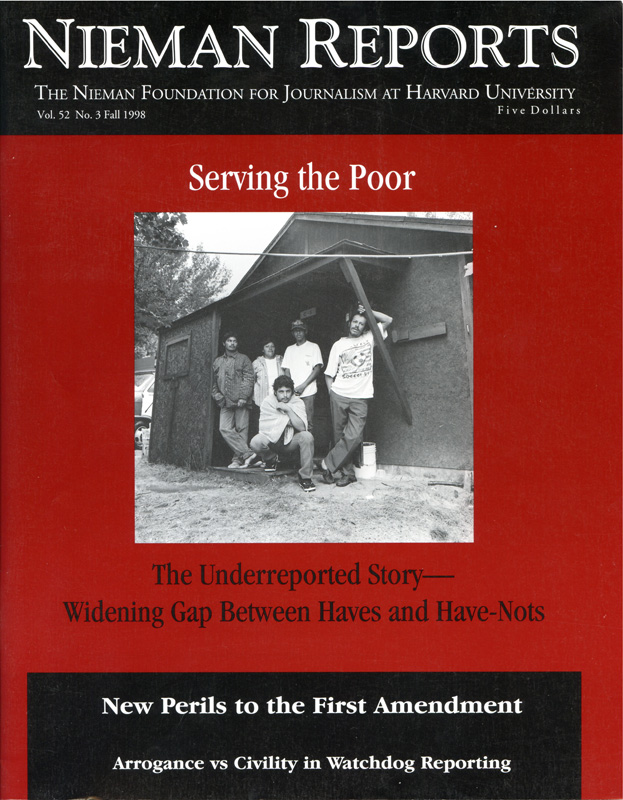Athens, Georgia
To the Editor:
Undoubtedly under severe space constraints, my good friend Phil Meyer and his co-author, M. David Arant, plucked a six-word quote from my book to lead their fine article on newsroom ethics (“Changing Values in the Newsroom,” Nieman Reports, Fall 1997.)
The partial quote has me finding that “everywhere are signs of ethical deterioration,” and it’s true that I so find.
However, I don’t want my many newspaper friends to infer from that partial quote that I’ve gone bonkers and joined the lunatic fringe that sees only error in what newspapers and other media do. My 351-page book is much more balanced than those six words imply.
The full quote is on pages XII and XIII of “Media Ethics,” published by Allyn & Bacon in 1995:
“Overall, media performance today in news and information is better than ever. Newspapers and magazines generally are far superior to those of yesteryear. Some broadcast journalism is outstanding. New, exciting means of electronic communication are just beyond the technological horizon. In the commercial marketplace, many public relations and advertising firms can be lauded for principled handling of ethically sensitive issues.
“Yet, everywhere are signs of ethical deterioration. NBC News admits to the worst institutional journalistic fraud in recent memory—staging a pickup truck explosion to illustrate an exposé on vehicle safety. Individual print and broadcast journalists are accused of unreasonable invasion of privacy, insensitive treatment of victims of rape and other crimes, and a host of other ethical lapses.
“Opinion polls show much of the public views media performance negatively. Journalists are regarded by many as arrogant, biased, unfair, unethical. Unarguably, there is widespread distrust of what the media do and how they do it.”
Conrad C. Fink
The writer is William S. Morris Professor of Newspaper Strategy and Management at the University of Georgia.
To the Editor:
Undoubtedly under severe space constraints, my good friend Phil Meyer and his co-author, M. David Arant, plucked a six-word quote from my book to lead their fine article on newsroom ethics (“Changing Values in the Newsroom,” Nieman Reports, Fall 1997.)
The partial quote has me finding that “everywhere are signs of ethical deterioration,” and it’s true that I so find.
However, I don’t want my many newspaper friends to infer from that partial quote that I’ve gone bonkers and joined the lunatic fringe that sees only error in what newspapers and other media do. My 351-page book is much more balanced than those six words imply.
The full quote is on pages XII and XIII of “Media Ethics,” published by Allyn & Bacon in 1995:
“Overall, media performance today in news and information is better than ever. Newspapers and magazines generally are far superior to those of yesteryear. Some broadcast journalism is outstanding. New, exciting means of electronic communication are just beyond the technological horizon. In the commercial marketplace, many public relations and advertising firms can be lauded for principled handling of ethically sensitive issues.
“Yet, everywhere are signs of ethical deterioration. NBC News admits to the worst institutional journalistic fraud in recent memory—staging a pickup truck explosion to illustrate an exposé on vehicle safety. Individual print and broadcast journalists are accused of unreasonable invasion of privacy, insensitive treatment of victims of rape and other crimes, and a host of other ethical lapses.
“Opinion polls show much of the public views media performance negatively. Journalists are regarded by many as arrogant, biased, unfair, unethical. Unarguably, there is widespread distrust of what the media do and how they do it.”
Conrad C. Fink
The writer is William S. Morris Professor of Newspaper Strategy and Management at the University of Georgia.



